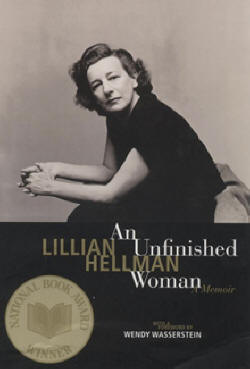

Queer Places:
New York University, New York, 10003, Stati Uniti
Columbia University (Ivy League), 116th St and Broadway, New York, NY 10027
Chilmark Cemetery, Chilmark, Massachusetts 02535, Stati Uniti
 Lillian Florence Hellman (June 20, 1905 – June 30, 1984) was an American
dramatist and screenwriter known for her success as a playwright on Broadway,
as well as her left-wing sympathies and political activism. She was
blacklisted after her appearance before the House Committee on Un-American
Activities (HUAC) at the height of the anti-communist campaigns of 1947–52.
Although she continued to work on Broadway in the 1950s, her blacklisting by
the American film industry caused a drop in her income. Many praised Hellman
for refusing to answer questions by HUAC, but others believed, despite her
denial, that she had belonged to the Communist Party.
Lillian Florence Hellman (June 20, 1905 – June 30, 1984) was an American
dramatist and screenwriter known for her success as a playwright on Broadway,
as well as her left-wing sympathies and political activism. She was
blacklisted after her appearance before the House Committee on Un-American
Activities (HUAC) at the height of the anti-communist campaigns of 1947–52.
Although she continued to work on Broadway in the 1950s, her blacklisting by
the American film industry caused a drop in her income. Many praised Hellman
for refusing to answer questions by HUAC, but others believed, despite her
denial, that she had belonged to the Communist Party.
As a playwright, Hellman had many successes on Broadway, including Watch on the Rhine, The Autumn Garden, Toys in the Attic, Another Part of the Forest, The Children's Hour and The Little Foxes. She adapted her semi-autobiographical play The Little Foxes into a screenplay, which starred Bette Davis and received an Academy Award nomination in 1942.
Hellman was romantically involved with fellow writer and political activist Dashiell Hammett, author of the classic detective novels The Maltese Falcon and The Thin Man, who also was blacklisted for 10 years until his death in 1961. The couple never married.
Hellman's accuracy was challenged after she brought a libel suit against Mary McCarthy. In 1979, on The Dick Cavett Show, McCarthy said that "every word she writes is a lie, including 'and' and 'the'." During the libel suit, investigators found errors in Hellman's popular memoirs such as Pentimento. They said that the "Julia" section of Pentimento, which had been the basis for the Oscar-winning 1977 movie of the same name, was actually based on the life of Muriel Gardiner.[1] Martha Gellhorn, one of the most prominent war correspondents of the twentieth century, as well as Ernest Hemingway's third wife, said that Hellman's remembrances of Hemingway and the Spanish Civil War were wrong. McCarthy, Gellhorn and others accused Hellman of lying about her membership in the Communist Party and being an unrepentant Stalinist.[2]
Elmer Holmes Bobst Library, NYU, New York City
Hellman's drama The Children's Hour premiered on Broadway on November 24, 1934, and ran for 691 performances.[10] It depicts a false accusation of lesbianism by a schoolgirl against two of her teachers. The falsehood is discovered, but before amends can be made one teacher is rejected by her fiancé and the other commits suicide.[11] Following the success of The Children's Hour, Hellman returned to Hollywood as a screenwriter for Goldwyn Pictures at $2500 a week.[12] She first collaborated on a screenplay for The Dark Angel, an earlier play and silent film.[13]
Following that film's successful release in 1935, Goldwyn purchased the rights to The Children's Hour for $35,000 while it still was running on Broadway.[14] Hellman rewrote the play to conform to the standards of the Motion Picture Production Code, under which any mention of lesbianism was impossible. Instead, one schoolteacher is accused of having sex with the other's fiancé.[15] It appeared in 1936 under the title, These Three.
Hellman was a long-time friend of author Dorothy Parker and served as her literary executor after her death in 1967.[90] Parker died on June 7, 1967, of a heart attack[3] at the age of 73. In her will, she bequeathed her estate to Martin Luther King Jr. Following King's death, her estate was passed on to the NAACP.[58] Hellman, bitterly but unsuccessfully contested this disposition.[59] Parker's ashes remained unclaimed in various places, including her attorney Paul O'Dwyer's filing cabinet, for approximately 17 years.[60]
My published books: